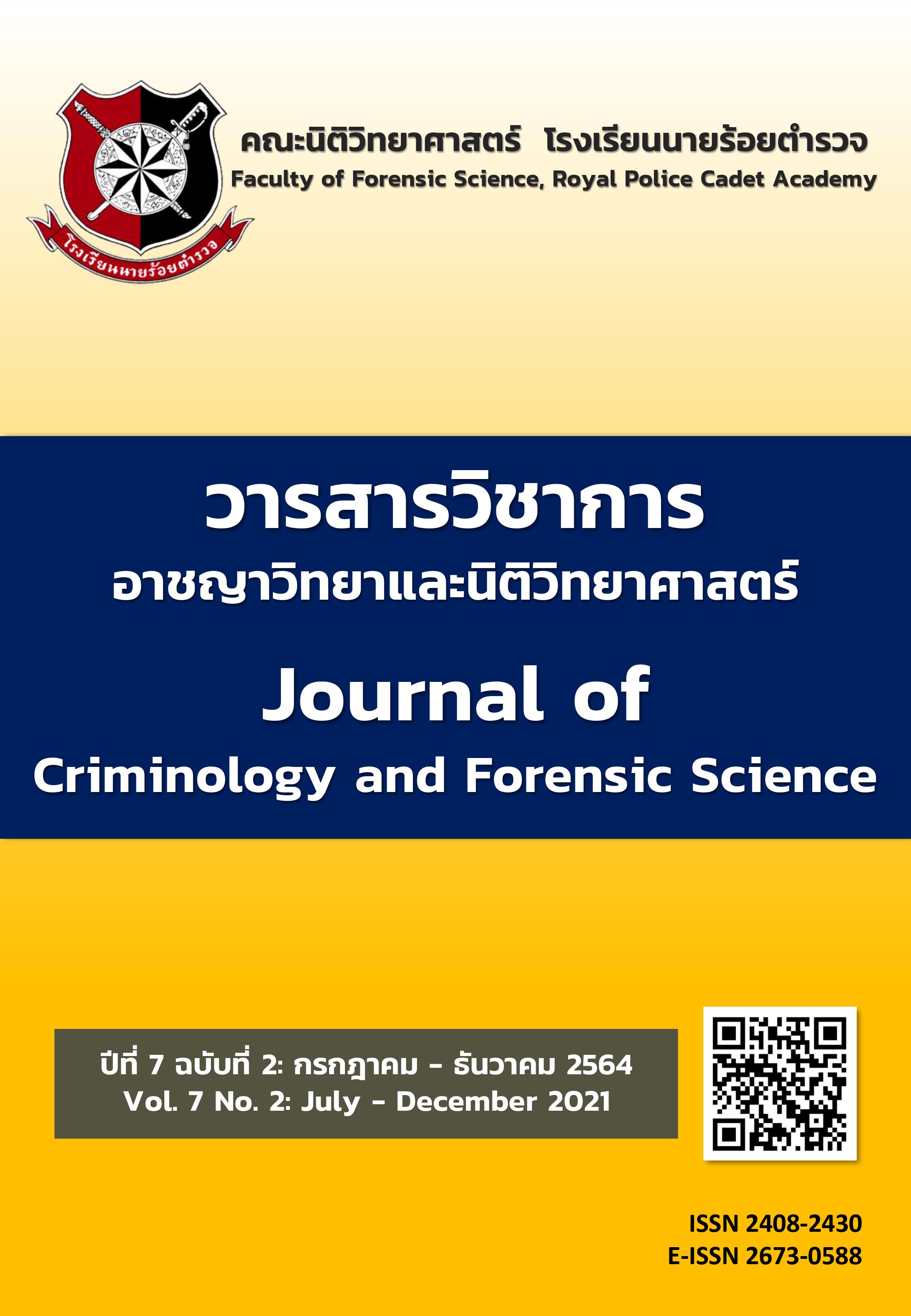ปัจจัยที่มีอิทธิพลต่อการเกิดอาชญากรรมไซเบอร์ของผู้ใช้โซเชียลมีเดียในเขตกรุงเทพมหานครและปริมณฑล
Main Article Content
บทคัดย่อ
งานวิจัยเรื่องนี้มีวัตถุประสงค์เพื่อศึกษาปัจจัยที่มีอิทธิพลต่อการเกิดอาชญากรรมไซเบอร์ของผู้ใช้โซเชียลมีเดียในเขตกรุงเทพมหานครและปริมณฑล โดยเป็นการวิจัยแบบผสมที่ประกอบไปด้วยการวิจัยเชิงปริมาณและการวิจัยเชิงคุณภาพ ซึ่งมีปัจจัยที่เกี่ยวข้อง 4 ปัจจัยได้แก่ 1) ข้อมูลส่วนบุคคล 2) พฤติกรรมผู้ใช้สื่อโซเชียลมีเดีย 3) ความรู้ความเข้าใจในอาชญากรรมทางไซเบอร์ และ 4) อัตราการเกิดอาชญากรรมทางไซเบอร์ โดยมีสมมุติฐาน 6 ข้อได้แก่ 1) ข้อมูลส่วนบุคคลมีผลทำให้พฤติกรรมของผู้ใช้สื่อโซเชียลมีเดียแตกต่างกัน 2) ข้อมูลส่วนบุคคลมีผลทำให้ความรู้ความเข้าใจในอาชญากรรมทางไซเบอร์แตกต่างกัน 3) ข้อมูลส่วนบุคคลมีผลทำให้อัตราการเกิดอาชญากรรมทางไซเบอร์แตกต่างกัน 4) พฤติกรรมของผู้ใช้สื่อโซเชียลมีเดียมีอิทธิพลต่อความรู้ความเข้าใจในอาชญากรรมทางไซเบอร์ 5) พฤติกรรมของผู้ใช้สื่อโซเชียลมีเดียมีอิทธิพลต่ออัตราการเกิดอาชญากรรมทางไซเบอร์ และ 6) ความรู้ความเข้าใจในอาชญากรรมทางไซเบอร์มีอิทธิพลต่ออัตราการเกิดอาชญากรรมทางไซเบอร์ ผลการวิจัยพบว่าปัจจัยส่วนบุคคลมีผลทำให้พฤติกรรมของผู้ใช้สื่อโซเชียลมีเดียเฉลี่ย ความรู้ความเข้าใจในอาชญากรรมทางไซเบอร์เฉลี่ย และ อัตราการเกิดอาชญากรรมทางไซเบอร์เฉลี่ย มีความแตกต่างกัน ในขณะที่พฤติกรรมของผู้ใช้สื่อโซเชียลมีเดียมีอิทธิพลในทิศทางเดียวกันกับความรู้ความเข้าใจในอาชญากรรมทางไซเบอร์ และอัตราการเกิดอาชญากรรมทางไซเบอร์ แต่พบว่าความรู้ความเข้าใจในอาชญากรรมทางไซเบอร์มีอิทธิพลในทิศทางตรงกันข้ามกับอัตราการเกิดอาชญากรรมทางไซเบอร์
Article Details
เนื้อหาและข้อมูลในบทความที่ลงตีพิมพ์ใน วารสารวิชาการอาชญาวิทยาและนิติวิทยาศาสตร์ โรงเรียนนายร้อยตำรวจ ถิอว่าเป็นข้อคิดเห็นและความรั้บผิดชอบของผู้เขียนบทความโดยตรงซึ่งกองบรรณาธิการวารสาร ไม่จำเป็นต้องเห็นด้วยหรือรับผิดชอบใดๆ
บทความ ข้อมูล เนื้อหา รูปภาพ ฯลฯ ที่ได้รับการตีพิมพ์ใน วารสารวิชาการอาชญาวิทยาและนิติวิทยาศาสตร์ ถือว่าเป็นลิขสิทธิ์ของวารสาร วารสารวิชาการอาชญาวิทยาและนิติวิทยาศาสตร์ หากบุคคลหรือหน่วยงานใดต้องการนำทั้งหมดหรือส่วนหนึ่งส่วนใดไปเผยแพร่ต่อหรือเพื่อกระทำการใดๆ จะต้องได้รับอนุญาตเป็นลายลักษณ์อักษรจาก วารสารวิชาการอาชญาวิทยาและนิติวิทยาศาสตร์ ก่อนเท่านั้น
เอกสารอ้างอิง
Albladi, S.M. and Weir, G.R.S. (2016). Vulnerability to Social Engineering in Social Networks: A Proposed User-Centric Framework. IEEE International Conference on Cybercrime and Computer Forensic (ICCCF).
Chena, R. and Sharma, S.K. (2013). Understanding Member Use of Social Net-working Sites from a Risk Perspective. Procedia Technology 9 (2013), 331-339.
Department of Administrative Affairs. (2018). Population statistics of Thailand. The Bureau of Registration Administration, Department of Administrative Affairs. (In Thai).
Hadlington, L. and Chivers, S. (2018). Segmentation Analysis of Susceptibility to Cybercrime: Exploring Individual Differences in Information Security Awareness and Personality Factors. Journal of Policy and Practice.
Hootsuite. (2018). Social Media Management Platform in Thailand 2018. Social Media and Marketing Solutions.
Keardsri, W., Meethongjan, K. and Kulnides, N. (2018). A Survey of the Variables Influencing Cybercrime among Social Media Users in Thailand. SSRU Graduate School Mini-Conference 2018. (In Thai).
Leukfeldt, R. (2017). Research agenda the human factor in cybercrime and cyber-security. Eleven International Publishing.
Riek, M. and Bohme, R. (2014). Understanding the influence of cybercrime risk on the e-service adoption of European Internet users. 13th Annual Workshop on the Economic of Information Security.
Smitherson, D. (2012). Impact of Cyber Crime and Security on Social Media. Social Media Today.
Wayuparb, S. (2018). Thailand Internet User Profile 2018. Electronic Transactions Development Agency Publication. (In Thai).
Yamane, T. (1973). Statistics: An Introductory Analysis. Third Edition, New York Harper and Row Publication.


